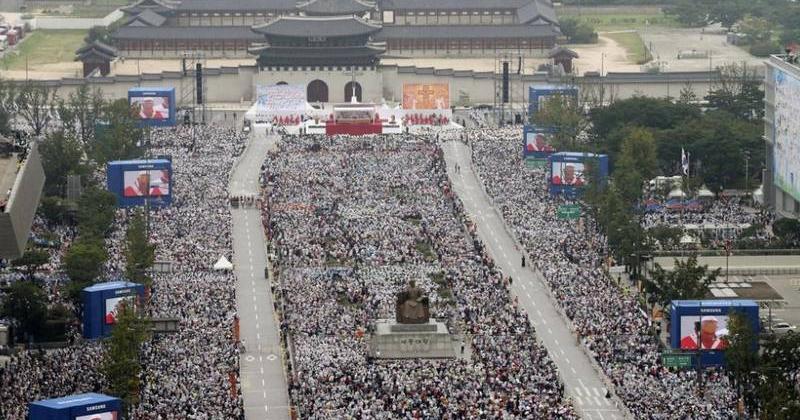“Korea’s first apostles were lay people!” Hundred of thousands of faithful (800,000 according to Fr. Lombardi’s estimates, a million according to the organisers) gathered today in the muggy heat to hear to Francis speak at the mass for the beatification of 124 Korean martyrs. They listened in silence, in the great Gwanghwamun Square in Seoul. The Pope took the opportunity on the third day of his Korean visit to stress the important role the laity plays in the Church’s mission. During the long wait before the Pope’s arrival, faithful recited the Rosary and sang. Francis travelled the length and breadth of the square to greet as many people as he could.
The mass - which was celebrated in red, the colour which symbolises martyrdom - began with the beatification rite. Paul Yun Ji-Chung and his 123 fellow martyrs were part of the first generation of Korean Catholics. Paul was martyred with his cousin for violating Confucian rituals by organising a Catholic funeral for his mother. Only one of the individuals in this group of martyrs was a priest, James Ju Mun-mo, the rest were all lay people. Ju Mun-mo was a Chinese man, the first priest to enter Korea and the first to celebrate mass in this land. He was known for his missionary work and after six years of service in Korea, the number of Catholics in the country had grown to ten thousand. He was decapitated and his head put on display and exposed to public mockery. When the image of the 124 newly beatified men appeared on the giant screens on either side of the altar, the crowds broke into a long applause.
“Christ is victorious and his victory is ours! Today we celebrate this victory in Paul Yun Ji-chung and his 123 companions. All of them lived and died for Christ, and now they reign with him in joy and in glory. With Saint Paul, they tell us that, in the death and resurrection of his Son, God has granted us the greatest victory of all,” Francis said in his homily. He emphasised the importance of their lay vocation by virtue of baptism. In God’s mysterious providence, the Christian faith was not brought to the shores of Korea through missionaries; rather, it entered through the hearts and minds of the Korean people themselves. It was prompted by intellectual curiosity, the search for religious truth. Through an initial encounter with the Gospel, the first Korean Christians opened their minds to Jesus. They wanted to know more about this Christ who suffered, died, and rose from the dead.”
“Korea’s first apostles were lay people,” the Pope said, adding a few new phrases to the prepared text . “This history tells us much about the importance, the dignity and the beauty of the vocation of the laity. I greet the many lay faithful present, and in particular the Christian families who daily by their example teach the faith and the reconciling love of Christ to our young.” Francis reminded priests and the consecrated that Jesus does not ask the Father “to take us out of the world. He sends his disciples forth to be a leaven of holiness and truth in the world ... In this, the martyrs show us the way.”
Francis pointed out that the new blesseds “knew the cost of discipleship. They were willing to make great sacrifices and let themselves be stripped of whatever kept them from Christ – possessions and land, prestige and honour – for they knew that Christ alone was their true treasure.” “So often today we find our faith challenged by the world and in countless ways we are asked to compromise our faith, to water down the radical demands of the Gospel and to conform to the spirit of this age. Yet the martyrs call out to us to put Christ first and to see all else in this world in relation to Him and His eternal Kingdom. They challenge us to think about what, if anything, we ourselves would be willing to die for.”
Finally, the Pope reiterated the importance of supporting the poor. “The example of the martyrs also teaches us the importance of charity in the life of faith. It was the purity of their witness to Christ, expressed in an acceptance of the equal dignity of all the baptised which led them to a form of fraternal life that challenged the rigid social structures of their day.” Francis explained that these martyrs refused to separate the twin commandment of love of God and love of neighbour which impelled them to such great solicitude for the needs of the brethren.” “Their example,” Francis concluded, “has much to say to us who live in societies where, alongside immense wealth, dire poverty is silently growing; where the cry of the poor is seldom heeded; and where Christ continues to call out to us, asking us to love and serve him by tending to our brothers and sisters in need.”
